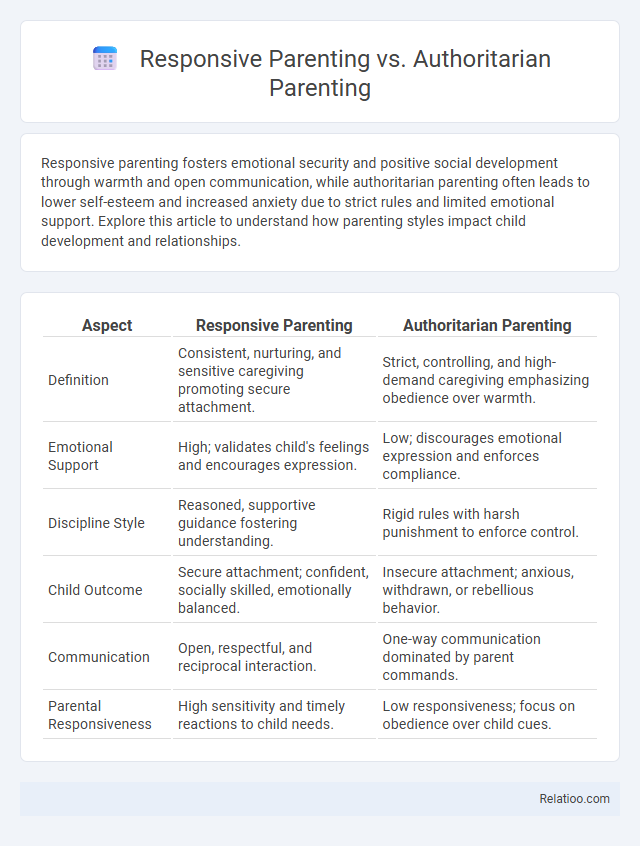Responsive parenting fosters emotional security and positive social development through warmth and open communication, while authoritarian parenting often leads to lower self-esteem and increased anxiety due to strict rules and limited emotional support. Explore this article to understand how parenting styles impact child development and relationships.
Table of Comparison
| Aspect | Responsive Parenting | Authoritarian Parenting |
|---|---|---|
| Definition | Consistent, nurturing, and sensitive caregiving promoting secure attachment. | Strict, controlling, and high-demand caregiving emphasizing obedience over warmth. |
| Emotional Support | High; validates child's feelings and encourages expression. | Low; discourages emotional expression and enforces compliance. |
| Discipline Style | Reasoned, supportive guidance fostering understanding. | Rigid rules with harsh punishment to enforce control. |
| Child Outcome | Secure attachment; confident, socially skilled, emotionally balanced. | Insecure attachment; anxious, withdrawn, or rebellious behavior. |
| Communication | Open, respectful, and reciprocal interaction. | One-way communication dominated by parent commands. |
| Parental Responsiveness | High sensitivity and timely reactions to child needs. | Low responsiveness; focus on obedience over child cues. |
Understanding Responsive Parenting
Responsive parenting emphasizes attuned, consistent reactions to a child's emotional and physical needs, fostering secure attachment and emotional regulation. Unlike authoritarian parenting, which relies on strict rules and obedience without flexibility, responsive parenting encourages open communication and warmth. Responsive caregiving integrates timely support and sensitivity, promoting optimal cognitive and social development in early childhood.
Defining Authoritarian Parenting
Authoritarian parenting is defined by strict rules, high expectations, and little emotional warmth or open communication between parent and child. This style emphasizes obedience and discipline, often using punishment to enforce compliance without considering the child's emotional needs. In contrast, responsive parenting and responsive caregiving prioritize sensitivity to the child's cues, emotional support, and nurturing interactions that foster secure attachment and healthy development.
Key Differences Between Responsive and Authoritarian Styles
Responsive parenting emphasizes understanding and nurturing Your child's emotional needs through open communication and empathy, fostering autonomy and trust. Authoritarian parenting relies on strict rules, high demands, and limited emotional responsiveness, often leading to obedience but less emotional connection. Responsive caregiving prioritizes timely, sensitive responses to a child's signals, promoting secure attachment, which contrasts with the rigid control characteristic of authoritarian styles.
Communication Approaches in Both Parenting Styles
Responsive parenting emphasizes open, empathetic communication, fostering a nurturing environment where children's thoughts and feelings are acknowledged and validated. Authoritarian parenting relies on directive, one-way communication, prioritizing obedience and control over emotional expression, often limiting children's opportunity to voice concerns. Responsive caregiving integrates consistent, sensitive interactions with clear expectations, balancing warmth and guidance to support emotional regulation and positive development.
Emotional Impact on Children
Responsive parenting fosters secure attachment and emotional regulation by consistently meeting children's needs and validating their feelings, promoting self-esteem and resilience. Authoritarian parenting, characterized by strict rules and high expectations with low warmth, often leads to increased anxiety, low self-worth, and difficulty in emotional expression among children. Responsive caregiving integrates sensitivity and adaptability, supporting healthy socio-emotional development by responding appropriately to children's emotional cues and promoting empathy and social competence.
Discipline Strategies Compared
Responsive parenting employs positive discipline strategies that emphasize understanding your child's emotions and promoting cooperation through gentle guidance. Authoritarian parenting relies on strict rules and punitive measures, prioritizing obedience over emotional connection, which may lead to fear or resentment. Responsive caregiving combines attentiveness and nurturing support, fostering self-regulation and empathy by responding thoughtfully to your child's needs and behaviors.
Effects on Child Development
Responsive parenting fosters secure attachment, emotional regulation, and social competence in children by meeting their needs sensitively and consistently. Authoritarian parenting, characterized by strict rules and high control, often leads to lower self-esteem, increased anxiety, and poorer social skills in children. Responsive caregiving emphasizes timely and appropriate responses, promoting cognitive development and resilience while mitigating behavioral issues in early childhood.
Long-Term Outcomes for Children
Responsive parenting, characterized by sensitivity to your child's needs and consistent emotional support, promotes secure attachment and fosters social competence, emotional regulation, and academic success in the long term. In contrast, authoritarian parenting, which relies on strict discipline and high demands with low responsiveness, often results in children experiencing lower self-esteem, increased anxiety, and impaired social skills. Responsive caregiving, an extension of responsive parenting especially in early childhood, supports optimal brain development and resilience, ensuring your child's healthier cognitive and emotional growth over time.
Cultural Influences on Parenting Styles
Cultural influences significantly shape the distinctions among responsive parenting, authoritarian parenting, and responsive caregiving by embedding unique values and expectations within family dynamics. In collectivist societies, authoritarian parenting often aligns with cultural norms emphasizing obedience and respect for authority, while responsive parenting and caregiving are more prevalent in individualistic cultures that prioritize emotional expressiveness and child autonomy. These cultural frameworks influence parental goals, disciplinary approaches, and emotional support, ultimately affecting child development outcomes across diverse social contexts.
Choosing the Right Parenting Approach
Choosing the right parenting approach involves understanding the distinct characteristics of responsive parenting, authoritarian parenting, and responsive caregiving. Responsive parenting emphasizes warmth and sensitivity to a child's needs, fostering secure attachment and emotional development. In contrast, authoritarian parenting relies on strict rules and high demands, often limiting open communication, while responsive caregiving balances structure with empathy, promoting positive behavior and healthy cognitive growth.

Infographic: Responsive Parenting vs Authoritarian Parenting
 relatioo.com
relatioo.com